
Johns Hopkins UniversityEst. 1876
America’s First Research University
Books for Understanding COVID-19

When a new disease emerges, one of the public’s biggest enemies can be misinformation. While everyone is encouraged to keep up to date with the latest progress of the 2019 novel coronavirus, the cause of the disease COVID-19, it is important to fully understand the various factors at play in identifying and controlling a global epidemic. These include concepts of epidemiology such as: prevention, vaccine development and distribution, regional health governance, international policy, and pillars of immunity and the immune system.
Below, we’ve put together a brief guide to JHUP books and authors that may help readers understand potential causes of the outbreak, what we can be doing now, and what the path forward may look like.
A Modern Contagion: Imperialism and Public Health in Iran's Age of Cholera by Amir A. Afkhami
In A Modern Contagion, Amir Afkhami argues that Iran’s nineteenth-century Cholera crisis had a profound influence on the development of modern Iran, steering the country's social, economic, and political currents.
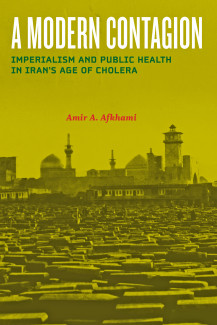
As the novel coronavirus continues its widespread infection of the Iranian population, Afkhami has been approached by multiple outlets, including The New York Times, to speak on the country’s modern disease control procedures. You can read these insightful pieces here: https://www.nytimes.com/2020/03/03/world/middleeast/coronavirus-iran.html
https://www.foreignaffairs.com/articles/iran/2020-03-02/pandemics-ravaged-iran-long-coronavirus
https://www.politico.com/news/2020/02/29/trump-coronavirus-iran-118270
Containing Contagion: The Politics of Disease Outbreaks in Southeast Asia by Sara E. Davies
In Containing Contagion, Sara E. Davies focuses on one of the world's most pivotal (and riskiest) regions in the field of global health: Southeast Asia. In recent years, this region has responded to a wave of emerging and endemic infectious disease outbreaks ranging from Nipah, SARS, and avian flu to dengue and Japanese encephalitis.
In the age of air travel and globalized trade, pathogens that once took months or even years to spread beyond their regions of origin can now circumnavigate the globe in a matter of hours. Disease Diplomacy traces the emergence of the new norms of global health security, the extent to which they have been internalized by states, and the political and technical constraints governments confront in attempting to comply with their new international obligations.
Adventures of a Female Medical Detective: In Pursuit of Smallpox and AIDS by Mary Guinan
In Adventures of a Female Medical Detective, Mary Guinan weaves together twelve vivid stories of her life in medicine (including her time at the Centers for Disease Control and Prevention), describing her individual experiences in controlling outbreaks, researching new diseases, and caring for patients with untreatable infections.
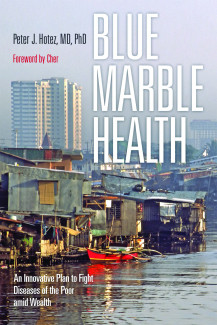
Blue Marble Health: An Innovative Plan to Fight Diseases of the Poor amid Wealth by Peter Hotez
In this book, vaccine scientist Dr. Peter Hotez describes a new global paradigm known as "blue marble health," through which he asserts that poor people living in wealthy countries account for most of the world’s illness – and that by crafting public policy and relying on global partnerships to control or eliminate some of the world’s worst poverty-related illnesses, it is possible to eliminate life-threatening disease while at the same time creating unprecedented opportunities for science and diplomacy.
Dr. Hotez, who is also the author of Vaccines Did Not Cause Rachel’s Autism (2018), has spoken widely about the effectiveness and benefits of vaccination for disease prevention. Speaking on the COVID-19 outbreak specifically, Dr. Hotez has appeared in numerous outlets – and in front of the House of Representatives – to dispel myths about vaccines and discuss how we can be developing a vaccine for the novel coronavirus right now.
You can read and watch some of Dr. Hotez’s comments on the outbreak here:
https://fortune.com/2020/02/27/coronavirus-amazon-anti-vaxxer/
https://www.wired.com/story/everything-you-need-to-know-about-coronavirus-vaccines/
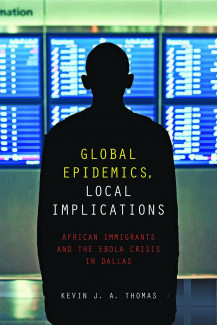
In Global Epidemics, Local Implications, Kevin J. A. Thomas uses the 2013 Ebola crisis in Dallas to highlight the complex ways in which disease outbreaks that begin in one part of the world affect the lives of immigrants in another.
Back when the virus first started to make headlines, many stories linked its name to that of the Chinese city in which it originated: Wuhan. In an effort to bring visibility to the social and cultural consequences such an association may invoke, Dr. Thomas spoke with news outlets about what we learned from the Ebola crisis and the negative impacts this had on African immigrants.
You can learn more via the following links:
https://think.kera.org/2020/02/05/what-ebola-meant-for-dallas-african-immigrants/
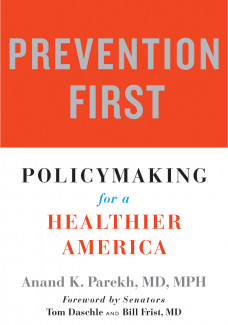
Prevention First: Policymaking for a Healthier America by Anand K. Parekh
In Prevention First, Dr. Anand K. Parekh, argues that disease prevention must be our nation's top health policy priority, with elected officials and policymakers playing a greater role in reducing preventable deaths.
Dr. Parekh has spoken with the Sirius XM POTUS show about what we could be doing to prevent the spread of COVID-19, and how we might prevent outbreaks like this in the future. Listen here: https://app.criticalmention.com/app/#clip/view/bfbc69f8-e65c-40e6-91e9-f03ec672e7d7?token=b43a9e78-f409-4be0-9d65-60ec0d1931a5
Pandemics, Pills, and Politics: Governing Global Health Security by Stefan Elbe
Pandemics, Pills, and Politics shows that the story of Tamiflu harbors deeper lessons about the vexing political, economic, legal, social, and regulatory tensions that emerge as twenty-first-century security policy takes a pharmaceutical turn.
The Fears of the Rich, The Needs of the Poor: My Years at the CDC by William H. Foege
In its seventy years, the Centers for Disease Control and Prevention (CDC) has evolved from a malaria control program to an institution dedicated to improving health for all people across the world. The Fears of the Rich, The Needs of the Poor is a revealing account of the CDC’s development by its former director, public health luminary William H. Foege.
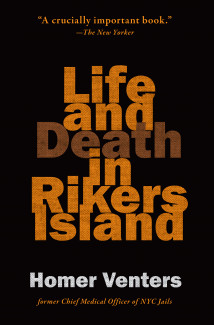
Life and Death in Rikers Island by Homer Venters
In Life and Death in Rikers Island, Homer Venters, the former chief medical officer for New York City's jails, explains the profound health risks associated with incarceration. From neglect and sexual abuse to blocked access to care and exposure to brutality, Venters details how jails are designed and run to create new health risks for prisoners—all while forcing doctors and nurses into complicity or silence.
Unfortunately, when we speak about vulnerable populations, it is rare we give a thought to the prison community. Living in such close proximity to one another (and with often unsafe and unhealthy conditions, as Dr. Venters describes in his book), inmates are especially susceptible to highly contagious illnesses. Dr. Venters wrote an op-ed for The Hill about what we can be doing to help mitigate this risk: https://thehill.com/opinion/criminal-justice/485236-4-ways-to-protect-our-jails-and-prisons-from-coronavirus?rnd=1582932792
Packed with illustrations, stories from Dr. William E. Paul’s distinguished career, and fascinating accounts of scientific discovery, Immunity presents the three laws of the human immune system—universality, tolerance, and appropriateness—and explains how the system both protects and harms us.


